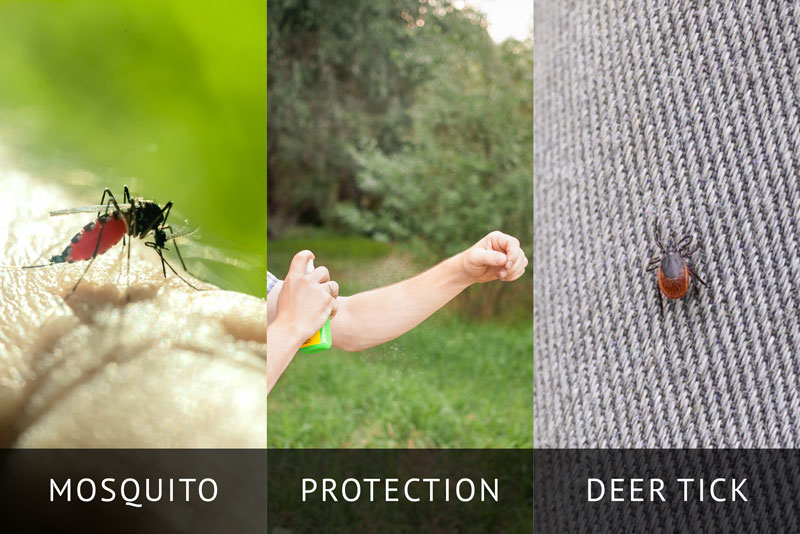Vector-borne Diseases in Central Illinois

Why mosquitos and ticks are a concern, and how to help protect yourself and your family against the diseases they may carry
What are vectors and vector-borne diseases?
Vectors are living organisms (such as ticks or mosquitos) that can transmit infectious diseases to other living hosts (people or animals.) In the cases of West Nile virus and Lyme disease, the insects contract the diseases from biting an already-infected bird or animal.
Once an insect vector becomes infected, it can pass the disease to another human or animal host through a bite. When a person gets an illness from being bitten by an infected vector, that person has a vector-borne disease.
Some vector-borne diseases will produce few noticeable symptoms in an infected person, and the illness may go undetected. However, the same diseases can also cause significant discomfort and illness, Including life-long disabilities or even death.
The following is basic information on West Nile virus and Lyme disease, both of which are carried by vectors common in Central Illinois.
West Nile virus
West Nile virus is the leading cause of mosquito-borne disease in the continental United States. Mosquitoes contract the disease from infected birds, then pass it on to other birds, animals, and humans.
Symptoms of West Nile virus
Approximately 80 percent of persons bitten by an infected mosquito have no disease symptoms. The remaining 20% of infected individuals may experience the following:
- Most symptoms typically occur from three to 14 days after the bite of an infected mosquito.
- Mild cases of West Nile may cause a slight fever or headache.
- More severe infections may include elevated or prolonged fever, head and body aches, disorientation, tremors, and convulsions.
- The most severe cases are rare but can result in complications such as meningitis or encephalitis, paralysis, or death.
- Individuals with chronic health conditions and those 60 years of age or older are at greater risk for more severe illness.
If you have experienced a mosquito bite and develop any of the above symptoms, you should seek medical attention. While most individuals recover from the West Nile virus without difficulty, those experiencing more severe illness may need medical intervention.
Preventing West Nile virus
The Centers for Disease Control and Prevention (CDC) recommends reducing the number of mosquitoes around your home and neighborhood to reduce your risk of exposure to West Nile virus and other mosquito-borne illnesses.
Removing or frequently emptying and replacing water reservoirs (birdbaths, buckets, trash containers, etc.) around your house reduces mosquitoes by eliminating the places where they lay their eggs.
The CDC also urges you to take personal precautions to avoid mosquito bites. Use EPA-registered insect repellant containing DEET and apply it when outside to protect vulnerable skin from mosquito bites. This is especially important during the hours of sunrise and sunset when mosquitoes are most active.
Lyme disease
Lyme disease is a bacterial disease transmitted by infected deer ticks, also known as black-legged ticks. These ticks usually acquire Lyme disease through bloodmeals from infected deer or small rodents. For humans, the risk of contracting Lyme disease increases if the tick has been attached for 36 hours or more.
It’s worth noting that not all ticks carry Lyme Disease. However, it is prudent to avoid tick bites whenever possible.
Symptoms of Lyme disease
Lyme disease signs and symptoms can vary significantly from one person to another. Symptoms also vary with the length of time since the initial infection and may include:
- A red, ring-like rash at the bite site, which usually occurs in about 70 - 80 percent of infected individuals. This rash can begin three to 32 days after the bite of an infected tick and grows over a few days or weeks.
- In addition to the rash, individuals may also experience fatigue, chills and fever, headache, swollen lymph nodes, and joint and muscle pain.
If you experience a rash or unexplained illness accompanied by fever following a tick bite, consult your physician as soon as possible and explain that a tick bit you.
Preventing Lyme disease
Prevention is always the best way to protect against Lyme disease and other vector-borne illnesses. Whenever possible, avoid tick-infested areas.
However, if you live in or visit wooded areas or areas with tall grass and weeds, greater vigilance may be necessary to keep you and your family safe. Regular mowing and weed trimming will help reduce the tick habitat around the outside of your house and on your property.
Reduce your risk of tick bites when you are outside by using insect repellent on your body and clothes. Examine yourself, your children, and your pets after being in areas of potential tick exposure. If found, remove and dispose of ticks promptly.
The Illinois Department of Public Health (IDPH) monitors the presence of Vector-borne diseases in Illinois to reduce the risk of illness to humans and animals. Throughout Illinois, local health departments support these efforts by:
- Collecting and submitting bird and vector specimens for testing.
- Providing opportunities and resources for environmental prevention efforts.
- Providing vector-borne illness prevention information to the public.
- Conducting follow-up for individuals diagnosed with vector-borne illnesses.
More information about vector-borne illnesses and prevention is available through the Illinois Department of Public Health (IDPH) or by contacting the Moultrie County Health Department at 217-728-4114.

